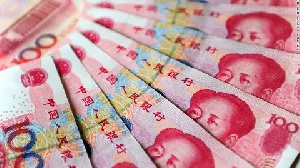 AGI has called on the Bank of Ghana (BoG) to consider enhancing its yuan trading capacities
AGI has called on the Bank of Ghana (BoG) to consider enhancing its yuan trading capacities
The Association of Ghana Industries (AGI) has called on the Bank of Ghana (BoG) to consider enhancing its yuan trading capacities in order to provide an alternative to the dollar to importers who do business in China.
Humphery Ayim-Darke, Vice President of the AGI, in an interview with the B&FT, said the increased introduction of the yuan as another trading currency like the dollar, euro or pound will reduce the demand for dollars as the sole medium of currency exchange.
“We believe it [the increased introduction of yuan] is a policy, if well thought through and well-positioned, that should help us diversify our transactions,” he said.
According to him, as an import-driven economy where over US$5billion worth of goods are imported from China annually, traders should be able to buy the yuan directly from banks or forex bureaus without going through the dollar.
“Why don’t you issue invoices in the yuan? If BoG has sufficient reserves of the yuan to do transactions, it will support and diversify the currency usage,” he added.
With the cedi coming under intense pressure in the greater part of the first quarter of 2017, the argument to stem the annual decline of the local currency is gathering steam with industry players offering suggestions on how best to arrest the constant decline of the currency.
After seeing close to 9 percent depreciation in the first two months and a half, the cedi has rallied to regain some of its losses over the past two weeks. But analysts are of the view that, a long-term plan is needed to stem these perennial decline.
Emmanuel Asiedu, Partner and Head of Tax at KPMG, explained that the fall of the currency is an interplay between demand and supply and the supply side is highly affected by commodity prices on the international market, payment of debt by importers and the local units of multinational companies paying dividends to parent companies.
To him, once debts are cleared by importers and local units pay off their dividends, the cedi will stabilise and continue to regain some of its losses once forex comes from exporters and also the annual cocoa syndication facility.
However, Mr. Asiedu noted that if the yuan is introduced as a currency to be traded just like the dollar, the pressure on the cedi will reduce drastically. “I believe China is now a major player and there is nothing wrong in recognizing its currency and using it,” he said.
But Mr. Raymong Amanful, Head of Banking Supervision at the Central Bank, noted that the challenge BoG is facing in supplying yuan into the market is that traders prefer to carry dollars in cash due to its relatively lesser volume compared to carrying equivalent in yuan. Also, traders do not do business with large scale suppliers but do what is termed ‘shop to shop’ purchases where they buy from retailers.
“Currently, a dollar is equivalent to ¥6.89. This means if a trader needs US$10,000 equivalent in yuan, he or she needs to be carrying ¥68,900, or 689 pieces of ¥100, the highest denominated yuan as compared to just a 100 pieces of US$100, the highest denominated dollar.
“So the challenges include convenience and issues likely to be faced at the point of entry for carrying all that cash. One of the things we have to understand is that these traders do shop to shop buying and not a designated large scale wholesaler who they buy everything from and therefore they need to carry this money.
So if they have large-scale trading partners in China then transfers can be done on their behalf but because they shop on need basis, it is a challenge,” he said.
Mr. Amanful noted that there is a need for more education from banks that have Chinese desks and have representative offices in China to talk to traders to transfer funds on their behalf so they do not even have to carry money on their way to China.
He assured that the Central Bank is in the position to supply more yuan. “It is a tradable currency and so if our people demand more of yuan, why do we keep other currency? We have to meet their needs,” he noted.
But a currency trader, who spoke on anonymity at one of the banks that deal with Chinese traders, noted that converting cedi into yuan it is not as easy as it sounds because there is always the need for an intermediary currency, which is usually the dollar.
“There is no direct conversion between the cedi and yuan or rmb. There is always an intermediary currency, the dollar. This means banks must always have dollars in its offshore accounts and cannot even give the large volumes of yuan to traders directly,” the source said.
In explaining how it works, the source noted that when a trader wants to do business in China and contacts a bank in Ghana, the trader must first go to the local bank here and deposit cedi into his or her local account.
Then the local bank quotes the rate of conversion to the trader, who accepts the rate and then proceeds to begin his or her travel. The local bank now must have that cedi equivalent in dollars in its offshore account to begin the process of transfer through another intermediary bank, usually Citibank from USA, or Deutsche Bank from Germany. These intermediary banks then credit the account of the trader’s supplier in China in dollars. After all these are done, the supplier then can withdraw the money in yuan.